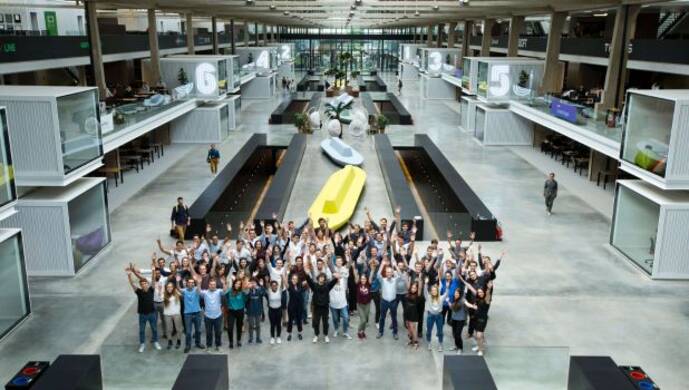The burden of knowledge
Scientific publications increase exponentially by about 4% per year. In some fields the pace is more rapid. As an example from medicine, “It is estimated that the doubling time of medical knowledge in 1950 was 50 years; in 1980, 7 years; and in 2010, 3.5 years…”. Not all of that information will be useful, but nevertheless, Ben Jones at Northwestern University calls this accumulation “the burden of knowledge”. It leads inventors and scientists to have to study longer before they reach a scientific breakthrough, and scientific teams to grow in size. Ph.D.’s are also taking longer to graduate, although since 1995 graduation age seems to have plateaued at about 30.
A global trend
The number of Ph.D.s graduating in the U.S. has been increasing substantially over time. NSF data show that graduations went up from 28,486 in 1997 to 41,294 in 2017, or 45%. What are the implications for the growing number of science Ph.D.’s who want to start or join a new business?
Apparently, the burden of knowledge is bad news for them. In our article recently published in the Strategic Entrepreneurship Journal, Serguey Brgauinsky and Yuheng Ding of the University of Maryland and I document that since 1997, the fraction of Ph.D.s in science and engineering who have started a new firm has declined by 38% in the U.S. The declines are wide-ranging and not driven by any particular demographic category or geographic region or scientific discipline and the decline also applies for those with a Ph.D. in science and engineering who want to join a startup. We do not have evidence from other regions, but the increasing burden of knowledge is a global phenomenon. It is unlikely that other regions can escape this pressure.
Working in large firms increasingly favored over startups
We use detailed individual-level job description data from surveys of doctorates to document important changes. In particular, we demonstrate that the differences in the nature of work, compensation, and allocation of talent have all changed dramatically between startups and large firms over time.
We demonstrate that the differences in the nature of work, compensation, and allocation of talent have all changed dramatically between startups and large firms over time.
These changes have over time increasingly favored working in established, and especially large firms, over startups. The decline in startup formation is for example accompanied by an earnings decline, increasing work complexity in R&D, and more administrative work for science-based founders. Founding a startup appears to have become increasingly harder over the past 20 years, while established firms are becoming more attractive workplaces for PhDs.
Why are startups hit harder than large established firms by the increasing burden of knowledge?
Larger firms can more easily pay to expand their hierarchies, more people are added to handle different tasks, and individuals specialize and are trained specifically on those tasks. Startups on the other hand have very limited scope for growing their hierarchies and specializing employees. Ultimately the burden falls on the founder/CEO to “know it all” and as the knowledge keeps increasing, the difficulty of being at the top forces more of them out.
So innovative work has gotten relatively more comfortable in large firms: Why should one care?
One shouldn’t care at all if one favors the concentration of innovative work to the already largest tech firms. But, if it is new firms from which many new technologies and business opportunities typically originate (Schumpeter, 1942) so that “[a] country cannot be great over a sustained period without a steady flow of great new firms” (Klepper, 2016, p. 62), then these trends are of great concern. The concentration of innovation to tech firms may also lead to various anti-competitive effects such as elevated consumer prices and “killer acquisitions” where large firms buy up startups and close them down.
The concentration of innovation to tech firms may also lead to various anti-competitive effects such as elevated consumer prices and “killer acquisitions”.
It is plausible that the decline in the fraction of Ph.D. founders and employees may flatten out as there are strong intrinsic motivations both to becoming a scientist and for a scientist to become a founder (or joiner) of a startup. Indeed, our data show a tendency for founders to be relatively more motivated by non-pecuniary motivations in more recent years. Those motivations may continue to fuel the creation of startups in the future.
If the goal is to restore business dynamism in the high-tech sector, then alleviating the negative impacts of the increasing complexity of innovation should perhaps be front and center in the strategy to attain it. Managers, university leaders and policy makers may need to find ways to make the job of the founder more attractive to keep the flow of commercialization of new ideas coming.
Alleviating the negative impacts of the increasing complexity of innovation should help restore business dynamism in the high-tech sector.
For founders, that may mean more training in multitasking and use of advanced management practices and technical management tools. AI will be helpful here. Another alternative is better working markets for good and experienced “natural” founders, and we see some indications in the data that this is happening. Organizations such as the Creative Destruction Lab that help scientists to become successful founders will become more important. (Listen to the Knowledge@HEC Breakthroughs podcast with its article here: Creative Destruction Lab Tackles AI and Geopolitics in Historic Super Session, ndlr)
The recent COVID-19 and recession shocks may not have helped in shifting the trend back, but have potentially reinforced it. For example, COVID-19 led to a flight to safety, where job seekers shifted their searches toward more established firms and away from early-stage startups.





